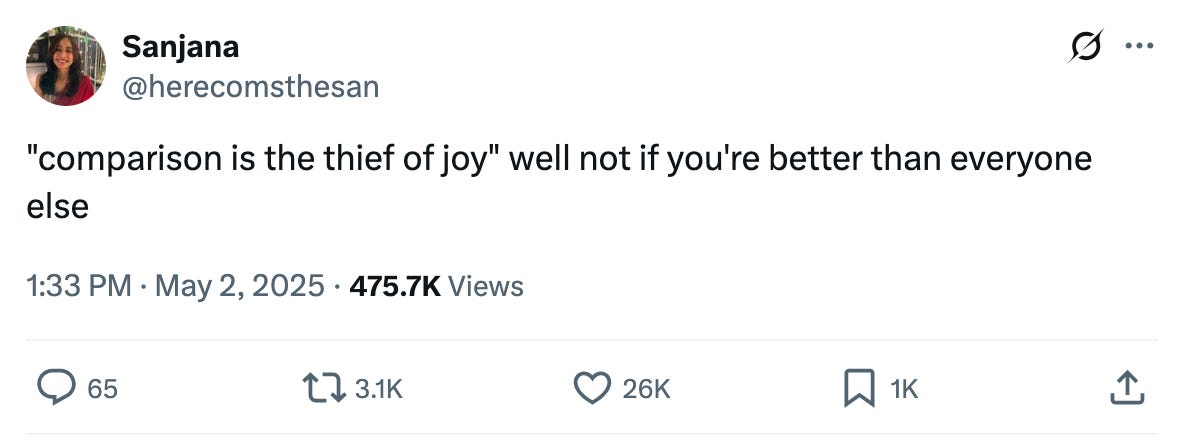Dea, May 3rd, Jakarta
Came across this tweet as I was devouring my bowl of scrambled eggs and porcini mushrooms earlier today:
In this era of distant friends shocking one another with a new Strava update of another half-marathon at a pace of 5 and a series of Instagram stories of their Hyrox training regime, it’s been made incredibly easy to feel that exactly, you are not better than everyone else. In fact, you may be worse. You are low agency because you skipped another cardio session this morning. You are low agency because you didn’t put in longer hours at work last week. You are never going to achieve greatness because you don’t make it a goal to be amongst the best.
I am a compulsive comparer. I kind of half-blame this on my Dad who kept asking me, “How high did everyone else score?” every time I brought him a test or exam result for the first sixteen years of my life, but the comparing really only intensified after graduating college, then securing my first internship, then my first job. I secretly looked to my right and left at all times to see where my performance was on the leaderboard. For the longest time, this was the only way I knew how to operate. But because most things I ended up disappointing myself on were related to some notion of merit, I thought that this would have never carried over to personal relationship aspects, like my role in a marriage.
Wrong.
It is quite literally effortless to compare yourself to your husband’s past romantic involvements. At this point your everyone else is women in his life before you came into the picture, and to be better than them requires you to know just precisely how they’ve been graced by his charm and wit. It feels good in a very sick way when you know exactly what to hold him against. The comparisons get even more feral then, because now you get to construct stories in your head about how things went with them, and how or why he chose to “end up settling with” you. It’s a million narratives that don’t end and somehow you’re always on the losing side.
So yes, I have to admit I found it helpful to have been diagnosed with OCD. What it confirms is that I have these rules I make up in my head about how things are supposed to go and when they don’t proceed in the exact way, form or shape as my mind intended them, I obsessively seek reassurances that bad things (for instance, my husband leaving me) won’t happen to me as a result. One of those rules, the most primary rule, is that I have to do a thing incredibly well and when possible, beat everyone else.
Exposure therapy was terrible, but it was successful in helping me detach myself from some of the more harmful elements in my own belief system. Such as one where I believed that I had to continuously outperform in all aspects so that my husband would see me as the perfect wife (there is no such thing, but my husband says he already does, I thank him for it). Or the one where I measure myself against others day in day out because I felt that I had to be in the top x percentile amongst my peers at what I do at all times (because otherwise, what…?)
The habit of comparing tends to stick and for a long time. For me, it has led to depressive episodes and many fights and a lot of money spent on undoing all the comparing. I loved the above tweet, I thought it was hilarious, but if you’re reading this, I want you to know that consistently looking outward has not brought me any joy in life.
It did, however, bring me to a realisation that what I feel most threatened by is people with deep curiosity who commit to things purely out of love for trying and with the intention of widening their own knowledge of the world, allowing themselves to continue doing the thing badly, if that happens to be the case, because they owe it to no one but themselves to see things through.
So I will allow myself to do all of this, including being married, badly and in ways that don’t necessarily make me better than everyone else at it, because I owe it to myself to love and be loved. And that’s a good enough reason.


